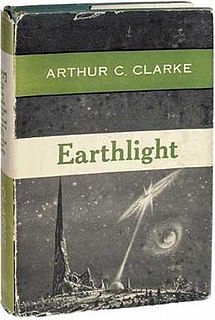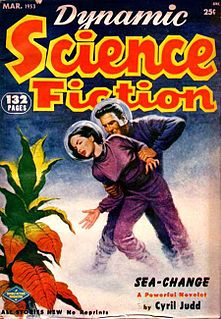Related Research Articles

Rendezvous with Rama is a science fiction novel by British writer Arthur C. Clarke first published in 1973. Set in the 2130s, the story involves a 50-by-20-kilometre cylindrical alien starship that enters the Solar System. The story is told from the point of view of a group of human explorers who intercept the ship in an attempt to unlock its mysteries. The novel won both the Hugo and Nebula awards upon its release, and is regarded as one of the cornerstones in Clarke's bibliography. The concept was later extended with several sequels, written by Clarke and Gentry Lee.

A weapon of mass destruction (WMD) is a nuclear, radiological, chemical, biological, or any other weapon that can kill and bring significant harm to numerous humans or cause great damage to human-made structures, natural structures, or the biosphere. The scope and usage of the term has evolved and been disputed, often signifying more politically than technically. Originally coined in reference to aerial bombing with chemical explosives during World War II, it has later come to refer to large-scale weaponry of other technologies, such as chemical, biological, radiological, or nuclear warfare.

Childhood's End is a 1953 science fiction novel by the British author Arthur C. Clarke. The story follows the peaceful alien invasion of Earth by the mysterious Overlords, whose arrival begins decades of apparent utopia under indirect alien rule, at the cost of human identity and culture.

Apocalyptic and post-apocalyptic fiction is a subgenre of science fiction, science fantasy, dystopia or horror in which the Earth's civilization is collapsing or has collapsed. The apocalypse event may be climatic, such as runaway climate change; astronomical, such as an impact event; destructive, such as nuclear holocaust or resource depletion; medical, such as a pandemic, whether natural or human-caused; end time, such as the Last Judgment, Second Coming or Ragnarök; or more imaginative, such as a zombie apocalypse, cybernetic revolt, technological singularity, dysgenics or alien invasion.

The Songs of Distant Earth is a 1986 science fiction novel by British writer Arthur C. Clarke, based upon his 1958 short story of the same title. He stated that it was his favourite of all his novels. Clarke also wrote a short step outline with the same title, published in Omni magazine and anthologized in The Sentinel in 1983.

Earthlight is a science fiction novel by British writer Arthur C. Clarke, published in 1955. It is an expansion to novel length of a novella of the same name that he had published four years earlier.

Without Warning is an American television film directed by Robert Iscove. It follows the duo of real-life reporters covering breaking news about three meteor fragments crashing into Northern Hemisphere. It aired on CBS on October 31, 1994, and is presented as if it were an actual breaking news event, complete with remote reports from reporters. The executive producer was David L. Wolper, who produced a number of mockumentary-style films since the 1960s.
Critical mass is the amount of fissile material needed to sustain nuclear fission.
"If I Forget Thee, O Earth" is a science fiction short story by English writer Arthur C. Clarke and first published in 1951 in the magazine Future SF. It was subsequently published as part of a short story collection in Expedition to Earth (1953). The title is taken from Psalm 137:5—"If I forget thee, O Jerusalem"—which consists of the writer lamenting over the destruction of Jerusalem by the Babylonian army. The themes in the story exploit the anxieties prevalent at the time regarding nuclear warfare.

The Hammer of God is a science fiction novel by Arthur C. Clarke originally published in 1993. Set in the year 2109, it deals with the discovery of an asteroid to be on course to collide with Earth and depicts the mission for deflecting the asteroid using fusion thermal rockets.
2001: A Space Odyssey is the 1968 science fiction novel written by Arthur C. Clarke and the 1968 film directed by Stanley Kubrick. It is a part of Clarke's Space Odyssey series, the first of four novels and two films. Both the novel and the film are partially based on Clarke's 1948 short story "The Sentinel", an entry in a BBC short story competition, and "Encounter in the Dawn", published in 1953 in the magazine Amazing Stories.

Firstborn is a 2007 science fiction novel by British writers Arthur C. Clarke and Stephen Baxter. It is the third book, billed as the conclusion of the A Time Odyssey series.

The Last Theorem is a 2008 science fiction novel by Arthur C. Clarke and Frederik Pohl. It was first published in the United Kingdom by HarperVoyager in July 2008, and in the United States by Del Rey Books in August 2008. The book is about a young Sri Lankan mathematician who finds a short proof of Fermat's Last Theorem, while an alien invasion of Earth is in progress.
"Rescue Party" is a science fiction short story by English writer Arthur C. Clarke, first published in Astounding Science Fiction in May 1946. It was the first story that he sold, though not the first one published. It was republished in Clarke's second collection, Reach for Tomorrow (1956), and also appears in The Collected Stories of Arthur C. Clarke (2001).

"Transience" is a science fiction short story by English writer Arthur C. Clarke, first published in 1949 in the magazine Startling Stories. It was later collected in The Other Side of the Sky and The Nine Billion Names of God.

"The Possessed" is a science fiction short story by British writer Arthur C. Clarke, first published in 1953.
Since its premiere in 1968, the film 2001: A Space Odyssey has been analysed and interpreted by numerous people, ranging from professional movie critics to amateur writers and science fiction fans. The director of the film, Stanley Kubrick, and the writer, Arthur C. Clarke, wanted to leave the film open to philosophical and allegorical interpretation, purposely presenting the final sequences of the film without the underlying thread being apparent; a concept illustrated by the final shot of the film, which contains the image of the embryonic "Starchild". Nonetheless, in July 2018, Kubrick's interpretation of the ending scene was presented after being newly found in an early interview.

A nuclear holocaust, nuclear apocalypse or atomic holocaust is a theoretical scenario where the mass detonation of nuclear weapons causes globally widespread destruction and radioactive fallout. Under such a scenario, large parts of the Earth are made uninhabitable by nuclear warfare, potentially causing the collapse of civilization and, in the worst case, the extinction of humanity.

Sir Arthur Charles Clarke was an English science-fiction writer, science writer, futurist, inventor, undersea explorer, and television series host.
"The Last Command" is a science fiction short story by English writer Arthur C. Clarke, first published in 1965. It describes events on a distant space station after a devastating nuclear war.
References
- ↑ Clarke, Arthur C. (2000). The Collected Stories of Arthur C. Clarke . Tom Doherty Associates. p. 89. ISBN 0-312-87860-5.
- ↑ Page at Internet Speculative Fiction Database